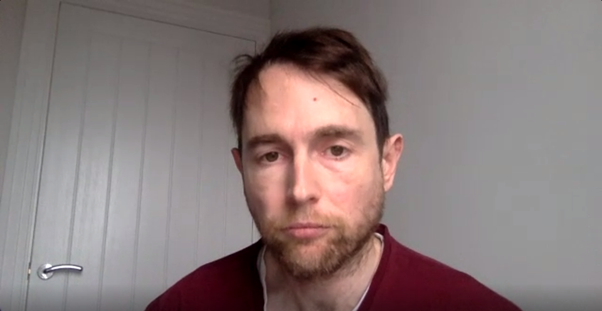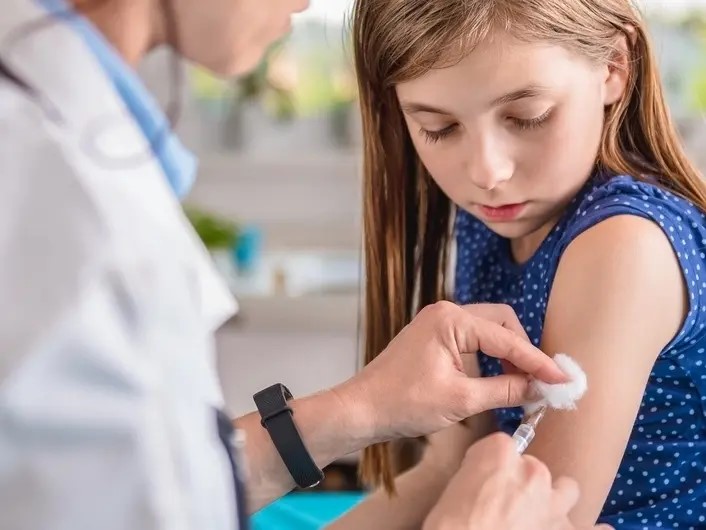There is a warning about the dangers of not vaccinating children against the “highly contagious” measles disease, following low vaccination rates in Cardiff and Newport.
Dr Simon Williams, a consultant for the World Health Organisation (WHO) , told CJS News measles is “quite literally one of the most contagious diseases known to humankind”.
Public Health Wales declared an outbreak in Cardiff in November, after seven children were confirmed to have the disease, and are still urging people to ensure their vaccinations are up to date.
Measles starts with a red or brown rash and it follows a fever, cough or runny nose.
Dr Williams warned the disease can spread very quickly, particularly in schools.
“I often refer to it as the Usain Bolt of viruses, it’s just so quick”.
If you have an unvaccinated class of children and one of the kids has measles, 9 out of 10 of those kids who come into close contact with that person will catch it. So, it’s much, much quicker than any of the COVID-19 variants for example, so it’s a problematic disease.
Dr Simon Williams, WHO Consultant
Why are some people vaccine-hesitant?
Dr Williams added people from ethnic minority groups and low-income areas are often those who are most vaccine-hesitant.

In his recent article for Time Magazine, Dr Williams, said this is due to a higher “vulnerab[ility] to conspiracy theories — a phenomenon which needs to be understood”.
A distrust in vaccines and the political authorities who recommend them isn’t new. Dr Williams wrote in his Time article: “Even before COVID-19, vaccine hesitancy was identified by the WHO as one of the biggest threats to human health”.
What is measles?
Whilst the measles rash and fever usually clears up in 7-10 days, complications can result in brain and lung infections and pneumonia, and can have long-lasting damage to children’s and vulnerable people’s immune systems.
What is also problematic is where we’re not seeing first doses. So, it is important for adults who aren’t up to date. Again, it’s never too late. We do have adults in their 20’s and 30’s who were babies and children’s during… the late 1990’s with the ‘MMR autism’ scandal who never got up to date.
Dr Simon Williams, WHO consultant
The first dose of MMR is usually given to babies at 12 months of age and the second just after three years of age.
Public Health Wales has urged parents to ensure they and their children had received both MMR vaccinations, and if not to arrange a vaccination. If not, measles, mumps and rubella outbreaks could become more frequent if herd immunity is not achieved.
In Cardiff and Newport, vaccination rates are “as low as 80% which is much, much below the 95% kind of levels” needed to achieve herd immunity.
Dr Williams said: “When vaccination rates dip below this 95% threshold, and it doesn’t need to dip too far below that to start seeing problems, and that’s what we saw in Cardiff”.
In Wales, only six counties meet this 95% or above rate: the Isle of Anglesey, Bridgend, Caerphilly, Merthyr Tydfil, Monmouthshire and Rhondda Cynon Taf.
What are the symptoms and how do I best protect myself and others?
Symptoms:
- Red or brown rashes (Note: this can be harder to spot on darker skin tones), which usually start on the head and spread down the body
- A fever
- Cough
- Runny nose
- Conjunctivitis (sore, red and watery eyes)
- Small white spots inside the mouth
What to do:
Ensure you and your children have had both doses of the MMR vaccine. The first dose should have been received as a one-year-old and the second dose as a three-year-old, but parents of children who are not yet of age do not need to take any action, but it is never to late to receive either dose.
Anyone, but especially children and vulnerable people, with symptoms should contact their GP or call NHS 111 Wales and stay home and away from school or work, particularly if those workplaces include children.

